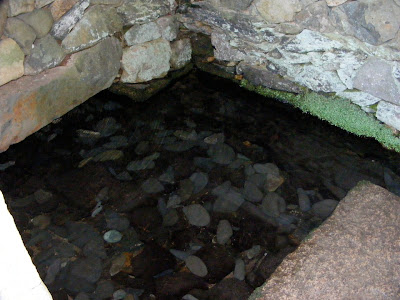
From Yawata, we drove on to Uji, famous for its green tea and for the Byodin temple, whose Heian phoenix shrine is famously illustrated on the 10 yen coin, but found it closed for restoration.
Opposite over the river is a small world heritage Shinto shrine and and there were cormorant fishers and delicate little cafes along the river's embankment.

























We then took the river side road passing by the temple, which ran around in a loop of hydro lakes from South East, eventually North, passing a colourful recluse Shingon temple on a hill with a lot of tributes to fire and flame,














We then raced on to Ishi-yamadera just before closing, when we found by accident it was lying in our path.











Ishi-yamadera is a delightful Shingon temple set on a hill with beautiful shrines and altars, classic painted screens, a pagoda set above a rock and moss garden, and the room where it is alleged Lady Murasaki wrote the Tale of the Genji.















Here is the room it is daid Lady Murasaki Shikibu wrote the Tale of the Genji, in the eleventh century Heian peak, for the women of the aristocracy. It is said to be the first novel, a title which shows how far ahead of European culture the Japan of the time actually was. The work recounts the life of a son of a Japanese emperor, known to readers as Hikaru Genji, or "Shining Genji". Genji is simply another way to read the Chinese characters for the real-life Minamoto clan, to which Genji was made to belong. For political reasons, Genji is relegated to commoner status and begins a career as an imperial officer.The tale concentrates on Genji's romantic life and describes the customs of the aristocratic society of the time. Much is made of Genji's good looks. His most important personality trait is the loyalty he shows to all the women in his life, as he never abandons any of his wives. When he finally becomes the most powerful man in the capital, he moves into a palace and provides for each of them, thus providing a unique insight into the sexual ethics of the imperial culture of the times. Yesterday while in Kyoto we went to another Matsura festival with chariots in Otsu adjacent to the shrine on the shores of Lake Biwa, very like the one in Kakunadote and one of the medieval floats had a marionette display with lady Murasaki and all the images of her novels parading before her.
Float of Lady Murasaki and her creations Otsu Matsura
Such tales are by no means fantasy. The original capital Nara had to be moved to Kyoto when a priest by the name of Dokyo managed to seduce an empress and nearly usurped the throne, and it was decided to move the court to a new location, out of the reach of Nara's increasingly powerful clergy.

Tale of the Genji provides a counterpoint to the tale of erotic entrapment spun in "Woman of the Dunes" whose inspiration we was in the great sand dunes North of Tattori mentioned in an earlier blog. An entomologist on an expedition to collect insects in an area of sand dunes is entrapped in a sand pit by local villagers to assist a widow who has been tasked by the villagers with digging sand to be sold to the cities and preventing the sands from encroaching on the house and her village. Junpei eventually becomes the widow's lover and resigns himself to his fate. The focus of the film shifts to the way in which the couple cope with the oppressiveness of their condition, and the power of their physical attraction in spite of - or possibly because of - their situation. At the end of the film Junpei gets his chance to escape, but he chooses to prolong his stay in the dune, in part because the woman is already pregnant with his child.

Sounds of the chanting at in mp3




































0 件のコメント:
コメントを投稿